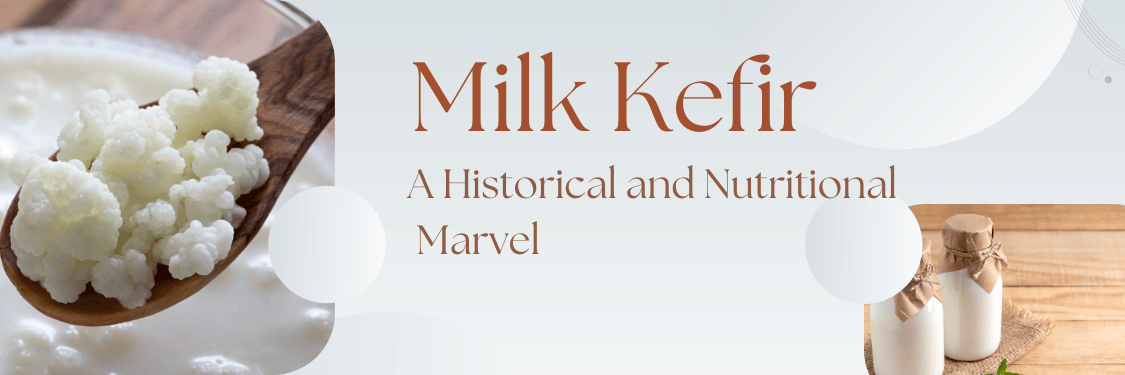Milk kefir is a fermented dairy product known for its probiotic properties and health benefits. This tangy, effervescent drink is made by fermenting milk with kefir grains, which are symbiotic colonies of bacteria and yeast. The history of milk kefir is as rich and complex as its flavour, spanning centuries and continents.
The
Origins of Kefir
The origins of kefir can be traced back to the North Caucasus Mountains, in the region that is now modern-day Russia and Georgia. According to folklore, kefir was discovered by shepherds who noticed that their milk would ferment into a tangy, effervescent drink after being stored in leather bags made from the stomachs of goats. These kefir grains, often referred to as Grains of the Prophet, were considered a gift from the prophet Mohammed.
Traditional
Methods
Traditionally, kefir was made by combining fresh milk and kefir grains inside goatskin bags. These bags were hung in doorways and prodded by passersby to keep the mixture well-mixed. This method not only facilitated fermentation but also ensured a continuous supply of kefir, as fresh milk was added to the bag as the kefir was consumed.
Cultural
Significance
For many centuries, the people of the Northern Caucasus region kept the secrets of kefir-making closely guarded. Kefir grains were considered a form of wealth, and the knowledge of how to make kefir was passed down through generations. The drink was highly prized for its health benefits, which include improved digestion, enhanced immune function, and even longevity.
Spread to
the Modern World
The secrets of kefir eventually spread beyond the Caucasus region in the early 20th century. Russian immunologist Dr. Ilya Ilyich Metchnikoff, who won the Nobel Prize in 1908 for his work on immunity, became interested in kefir as a potential health food. His research helped to popularize kefir in Russia and eventually in Europe and North America.
Nutritional
Benefits
Milk kefir is a powerhouse of nutrients and probiotics, making it a valuable addition to a healthy diet. Here s a detailed look at its nutritional benefits:
1. Rich Source of Nutrients
Milk kefir is packed with essential nutrients. A typical one-cup serving of low-fat milk kefir contains:
Protein: 9 grams
Calcium: 24% of the Daily Value (DV)
Phosphorus: 20% of the DV
Vitamin B12: 29% of the DV
Riboflavin (B2): 25% of the DV
Magnesium: 7% of the DV
Vitamin D: 12% of the DV
These nutrients are crucial for maintaining bone health, energy production, and overall metabolic functions.
2. Probiotic Powerhouse
Kefir is renowned for its high probiotic content. It contains up to 61 strains of bacteria and yeasts, making it a more potent source of probiotics than yogurt and other probiotic foods. These probiotics help balance the gut microbiome, which can improve digestion, enhance immune function, and even influence mental health.
3. Improved Digestion and Lactose Tolerance
The probiotics in kefir aid in breaking down lactose, the sugar in milk, making it easier to digest for those who are lactose intolerant. Regular consumption of kefir can improve overall digestion and reduce symptoms of lactose intolerance.
4. Antibacterial Properties
Certain probiotics found in kefir, such as Lactobacillus kefiri, can inhibit the growth of harmful bacteria like Salmonella, Helicobacter pylori, and E. coli1. This antibacterial effect helps maintain a healthy gut environment and prevents infections.
5. Anti-Inflammatory and Antioxidant Effects
Kefir contains bioactive compounds, including peptides and organic acids, that have anti-inflammatory and antioxidant properties. These compounds help reduce inflammation in the body and protect cells from oxidative stress, which can lower the risk of chronic diseases.
6. Bone Health
The high calcium and vitamin K2 content in kefir are essential for bone health. Vitamin K2 helps in the proper utilization of calcium, improving bone density and reducing the risk of fractures.
7. Potential Anti-Cancer Properties
Some studies suggest that kefir may have anti-carcinogenic properties. The probiotics and bioactive compounds in kefir can inhibit the growth of cancer cells and reduce the risk of certain cancers.
8. Blood Sugar Control
Kefir has been shown to help control blood sugar levels. The probiotics in kefir can improve insulin sensitivity and reduce blood sugar spikes, making it beneficial for people with diabetes.

